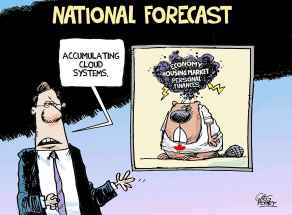PCs’ blitz of bills brings prediction of early election
Read this article for free:
or
Already have an account? Log in here »
To continue reading, please subscribe:
Monthly Digital Subscription
$0 for the first 4 weeks*
- Enjoy unlimited reading on winnipegfreepress.com
- Read the E-Edition, our digital replica newspaper
- Access News Break, our award-winning app
- Play interactive puzzles
*No charge for 4 weeks then price increases to the regular rate of $19.00 plus GST every four weeks. Offer available to new and qualified returning subscribers only. Cancel any time.
Monthly Digital Subscription
$4.75/week*
- Enjoy unlimited reading on winnipegfreepress.com
- Read the E-Edition, our digital replica newspaper
- Access News Break, our award-winning app
- Play interactive puzzles
*Billed as $19 plus GST every four weeks. Cancel any time.
To continue reading, please subscribe:
Add Free Press access to your Brandon Sun subscription for only an additional
$1 for the first 4 weeks*
*Your next subscription payment will increase by $1.00 and you will be charged $16.99 plus GST for four weeks. After four weeks, your payment will increase to $23.99 plus GST every four weeks.
Read unlimited articles for free today:
or
Already have an account? Log in here »
Hey there, time traveller!
This article was published 11/03/2019 (2465 days ago), so information in it may no longer be current.
Four days into the spring sitting of the legislature, the Progressive Conservatives are operating like a government hell-bent on completing its bucket list, again sparking speculation of an early election call.
On Monday, the PCs introduced six bills, including one that limits public possession of cannabis and another that gives hospital security guards more powers.
That’s after introducing broad reforms to health care governance last Wednesday, a new budget Thursday that reduces the PST by a percentage point, and an omnibus bill the same day that amends tax statutes, implements the budget and ends the practise of taxpayer rebates on a portion of candidate and political party campaign expenses.

The six bills tabled on Monday ranged from a single-page document that would allow all retail beer vendors to sell cider and coolers, to an 18-pager amending a host of statutes, including one that would establish July 1 as a fixed statutory holiday for retail purposes, thus allowing for businesses to close on that day, rather than July 2, when Canada Day falls on a Sunday.
“I think part of this is the PCs are trying to get as much of their agenda (out in public)…in order to call an election despite Manitoba’s fixed date election law,” said Liberal Leader Dougald Lamont.
The next provincial election is set for Oct. 6, 2020, but Premier Brian Pallister has not ruled out an earlier call.
“There’s no reason not to follow it,” Lamont said of the fixed election date. “But the premier seems determined not to.”
An amendment to The Liquor, Gaming and Cannabis Control Act would prohibit the possession of more than 30 grams of marijuana in a public place.
While federal law already sets possession limits, the amended Manitoba statute would allow provincial inspectors to have the power to levy fines.
“This will allow our provincial officials to have enforcement here in Manitoba,” Justice Minister Cliff Cullen said.

Another bill introduced on Monday raised the ire of organized labour.
An amendment to The Labour Relations Act would end the use of government-supplied mediators and conciliators to help companies and unions negotiate collective agreements. Instead, companies and unions needing a third party to get them through a difficult round of negotiations would have to go to the private sector — at their own cost — for help.
Kevin Rebeck, president of the Manitoba Federation of Labour, called Bill 18 a “short-sighted and ideological” move that could lead to more costly strikes and lockouts. He said when the government floated the idea, both business and labour opposed it, saying the current system is working well.
“It’s really a penny-wise, pound-foolish move that’s going to set things back,” Rebeck said.
Growth, Enterprise and Trade minister Blaine Pedersen introduced amendments to The Workplace Safety and Health Act that would eliminate the chief prevention officer position, transferring it to Safe Work Manitoba; strengthen fines for workplace infractions and prevent “frivolous and vexatious complaints from being forwarded to the Manitoba Labour Board.”
Crown Services Minister Colleen Mayer said Bill 11 would enable some 137 rural beer vendors to expand their product line and provide greater convenience to consumers. “This is part of our government’s priority to reduce red tape, to provide more choices and convenience for the consumer and greater opportunity and flexibility for businesses,” she told the legislature.
Not to be outdone, NDP Opposition MLA Nahanni Fontaine introduced three bills of her own on Monday, including one that would prevent veterinarians from declawing cats unless there is a veterinary medical reason to do so.

A second bill would amend The Animal Care Act to prohibit a person from possessing, at any premises, more than four female dogs capable of reproduction.
Fontaine’s third bill would amend The Provincial Court Act to require a person to receive sexual assault awareness training before taking office as a judge or before taking office as a justice of the peace designated to hear matters under The Domestic Violence and Stalking Act.
larry.kusch@freepress.mb.ca
Subsidy change will hurt Tories more: Pallister
PREMIER Brian Pallister rejects the assertion the Progressive Conservatives have the most to gain from a proposed legislative amendment that would eliminate election campaign subsidies for candidates and political parties.
In fact, the opposite is true, he said Monday.
Last week, the government introduced an omnibus bill that included a provision to end the taxpayer reimbursement of 50 per cent of campaign expenses to parties and candidates who garner at least 10 per cent of the vote in an election.
Many see the move as especially benefitting a well-funded organization like the Progressive Conservative party, which also has the advantage of incumbency.
Not so, the premier said.
“The way the system works now, the big parties get far greater benefit from the subsidy than do smaller parties and Independent candidates,” he told reporters.
He said under the proposed amendment, the PC party would forgo “about $1.45 million,” or approximately half the $3 million in campaign reimbursements that were paid following the 2016 provincial election.
“The PC party is forgoing far more than any other party by eliminating this program,” he said.
“What this subsidy does is it allows us to double up on our money by getting a subsidy for our advertising costs, which we pay from donated money. We’re giving that away.”
Liberal Leader Dougald Lamont wasn’t impressed with the premier’s argument.
“Yes, he’s a real martyr,” he quipped.
Lamont has criticized the proposed measure, calling it “bad for democracy.”
He said it will make it more daunting for candidates with limited means to run for office.
— Larry Kusch

Our newsroom depends on a growing audience of readers to power our journalism. If you are not a paid reader, please consider becoming a subscriber.
Our newsroom depends on its audience of readers to power our journalism. Thank you for your support.
History
Updated on Monday, March 11, 2019 10:31 PM CDT: Adds sidebar









